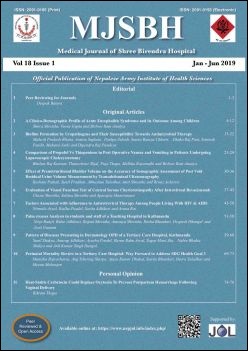Heat-Stable Carbetocin Could Replace Oxytocin To Prevent Postpartum Haemorrhage Following Vaginal Delivery
Keywords:
Postpartum Hemorhage, Oxytocin, Heat-stable carbetocinAbstract
Postpartum haemorrhage (PPH) is the most common type of obstetric haemorrhage and accounts for 35% of all maternal deaths. World Health Organisation (WHO) defines PPH as: blood loss of 500 mL or more within 24 hours following vaginal delivery. PPH is the leading cause of maternal mortality in low-income countries, and the primary cause of nearly one quarter of all maternal deaths globally. Uterine atony is the most common cause of PPH accounting for more than 80% of causes. Thus, to prevent PPH, WHO has recommended active management of third stage of labor. All women giving birth should be offered uterotonics during the third stage of labor (as a part of third stage management) for the prevention of PPH; oxytocin (IM/IV, 10 IU) is recommended as the uterotonic drug of choice.
Conclusion: Heat stable carbetocin can be a breakthrough drug for overcoming heat degradation of oxytocin. Cold chain for storage or transportation of uterotonic drug is thus now not an issue. This single advantage can remarkably reduce the morbidity and mortality in low-income countries due to PPH as this drug can be made available even in most remote part of the country. Heat-stable carbetocin was studied aiming the developing countries. We can hope to see this drug in the new update in WHO recommendation for prevention of postpartum hemorrhage; that undoubtedly would be a very remarkable change, especially for resource limited countries like ours.
Downloads
Downloads
Published
How to Cite
Issue
Section
License
This license enables reusers to distribute, remix, adapt, and build upon the material in any medium or format for noncommercial purposes only, and only so long as attribution is given to the creator.




